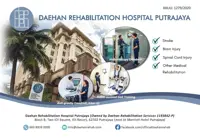
Daehan Rehabilitation Hospital Putrajaya offers customised rehabilitation services that focus on intensity and discipline to give patients with neurological and orthopaedic disabilities optimal results.
Strokes and other neurological disabilities often leave individuals with lasting and damaging effects that can greatly impede their daily functions. This brings to light the imperative need to raise awareness on the crucial and beneficial role rehabilitation can play in the lives of such patients.
According to Dr Fazah Akhtar, studies have shown that early and high intensity rehabilitation has given patients better outcomes. “Certain neurological conditions such as strokes and traumatic brain injury have a window period of best recovery after the event. If an individual were to undergo high intensity inpatient rehabilitation in a specialised hospital or unit, the recovery and functional outcomes of the patient have shown to be better than those who do not receive such treatment.”
Understanding this approach, Daehan Rehabilitation Hospital Putrajaya offers South Korean-styled rehabilitation services in which they are on a one-on-one basis and are personalised to specifically match the needs of the individual. Besides stroke patients, they also manage cases of traumatic brain injuries, hypoxic brain injuries, brain tumours, spinal cord injuries, musculoskeletal conditions, and other complex conditions that require multidisciplinary rehabilitation.
With an emphasis on intensity and discipline, the inpatient rehabilitation programmes are planned and targeted for a duration of three months with extensions as needed. A programme’s daily schedule usually features several rehabilitation sessions, starting at 9am and finishing at 5pm.
In addition, parts of the programme are practised in open and spacious therapy areas such as the gymnasium to enhance engagement and social interactions between patients. This forms a support group system and such peer encouragement has seen a positive impact on the programme, says Dr Fazah Akhtar. All this is further augmented by technological advancements such as gait robotics, computer-based therapy, individualised hydrotherapy, and anti-gravity treadmills.
Their full list of therapy programmes include physiotherapy, occupational therapy, functional electrical stimulation (FES), pain therapy, speech therapy, dysphagia rehabilitation, computerised cognitive function therapy, activities for daily living (ADL) training, return to work training, pulmonary rehabilitation, machine treatment, gait training with special equipment, robot-assisted gait trainer, hydrotherapy treadmill, and anti-gravity treadmill. Meanwhile, their facilities and services include an emergency department, room and board, imaging department, specialist clinic, day care service, inpatient and outpatient services, and outdoor therapy.
While Daehan Rehabilitation Hospital Putrajaya only offers their services to adults at this point in time, there are plans to expand to paediatrics rehabilitation in the near future.
For more information, call 03-8939 0000.
KKLIU No. 1279/2020









































